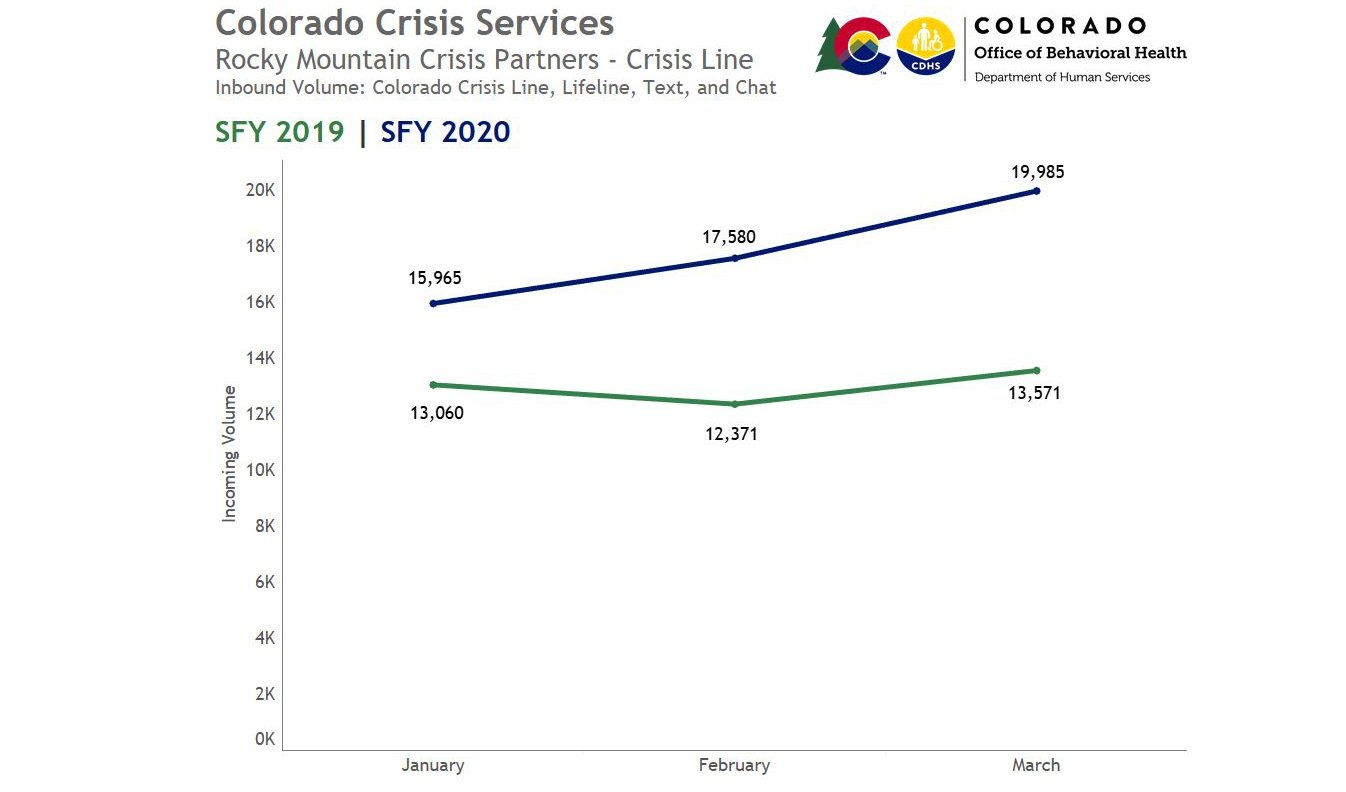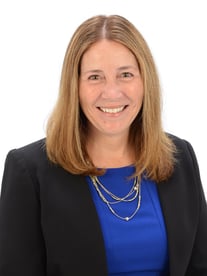Colorado is no stranger to disaster, with its devastating floods and record mass shootings. But living through the COVID-19 pandemic, an invisible threat with no known end in sight, creates a whole new set of challenges – especially when you can’t hug your neighbors.
A social distancing mandate – as people lose their jobs, their savings, their graduation dreams or, worse, their loved ones – adds a new element to a crisis that experts predict will result in a major mental health fallout. Researchers on the University of Colorado Anschutz Medical Campus have launched two international surveys this month in hopes of building better responses to these unprecedented stressors for the future.
For now, the experts say, staying socially connected in any way possible remains the most important thing people can do to emerge from this COVID-19 crisis mentally strong.
Two CU Anschutz research teams are circulating surveys to better understand the psychological fallout of the current pandemic and inform effective responses for the future. They ask community members to take the surveys and share with their own networks.
Population Mental Health and Wellbeing Program, Colorado School of Public Health Survey
High Plains Research Network, Department of Family Medicine Survey
Chronic nature creates snowball effect
“The long-term nature of this crisis is really what sets it apart from others,” said Jennifer Jewell, MSPH, program manager of the Population Mental Health and Wellbeing Program in the Colorado School of Public Health, which recently launched a longitudinal study that will chart changes in psychological wellbeing throughout the pandemic.
“We are used to traumatic events that last a day or a few days and then things start to get back to whatever normal was before,” Jewell said. This time, as Gov. Jared Polis reiterated this week, that’s not going to happen any time soon, if ever.
Jennifer Jewell
The chronic fear and isolation and the repercussions of the social distancing order (working at home, teaching at home, being at home alone) have prompted many of the record-number of calls to overburdened mental health care workers, who are dealing with dynamics they have never seen before.
Isolation goes against human nature, the governor acknowledged. “It’s a horrific thing,” Polis said, as he told Coloradans this week to expect stay-at-home rules to remain for some time.
CU Anschutz researchers targeting critical need
“I think that we are going to see front-line workers that come out of this event with higher than normal trauma-related mental health struggles,” Jewell said of the caregivers whose potential exposure to the virus may intensify their need for isolation from friends and family. Anxiety and depression are expected to rise in the homebound general population, she said.
“We are hoping to get a better grasp on the severity of those changes so that we are able to inform population-level intervention efforts,” Jewell said of her team’s survey, similar to one launched this month by Tamara Oser, MD, associate professor and director of the High Plains Research Network in the Department of Family Medicine.
“I think the psycho-social impact is much more extreme than people realize,” Oser said. “We already have problems in this country with poor mental health, opioid abuse disorder and suicide. I think it’s crucial, particularly for the research community, to assess the additional effect of social distancing related to COVID-19 so we can start designing interventions and be prepared as a healthcare community.”
The time for social support is now
Tamara Oser
While the survey data should help transform large-scale disaster response for the mental health profession, the end goal remains a long way off. “For now, I think it’s important that we stay connected with our friends and family through calls, texts, video chats, social media – anyway that we can so that we all feel less alone,” Jewell said.
The research is clear that social isolation and loneliness can negatively affect mental health, said Courtney Welton-Mitchell, PhD, a clinical assistant professor in the Colorado School of Public Health who specializes in public health preparedness and disaster response. People who are faring better are those who realize “social” distancing really means “physical” distancing and are staying connected, she said.
“When people are feeling fearful and anxious, they are in even greater need of social support,” Welton-Mitchell said. “Social support is actually a powerful predictor of positive mental outcomes. One of the most important things we can do to mitigate those feelings is to reach out and connect with others.”
Keep talking, dancing, sewing and howling
The effects of social distancing are not all bad, Welton-Mitchell said, adding that some people have grown their social networks through virtual and other means during the pandemic. Whether it’s online book clubs, dance lessons, exercise classes or gaming groups: “You’d be hard-pressed to not find an online activity to fill an interest,” she said.
Active online activities, with engaged interaction, far outweigh passive social media use, such as scrolling through Facebook to pass the time, she said. “There is some research that has suggested that being a passive observer on social media, looking through Facebook and seeing other people’s curated versions of their lives, can actually make people feel more isolated and more alone,” she said.
Courtney Welton-Mitchell
Welton-Mitchell suggests finding innovative ways to connect while maintaining physical distancing and remembering that “old-fashioned” means of communication work, too. “My daughter is 9, and she has been spending more time on the phone talking to my mother who lives in Florida over the past three weeks than we would typically talk to her in almost a year.”
Facing a universal crisis also breeds feelings of togetherness, a good form of mental health medicine, she said. “In some ways, this form of solidarity and experiencing something together can facilitate greater empathy and connection and social support,” Welton-Mitchell said (e.g. howling with the world every night at 8 p.m. or sewing masks for friends and healthcare providers.)
The best medicine: Take care of each other
As people remember everyone is in this together, they should also make sure to watch out for their at-risk neighbors, said Welton-Mitchell. Most notably, she said: people with preexisting mental health issues, those who may have had little social connection to begin with, those who lack online access, and those who are uncomfortable with the use of technology.
“As people become increasingly anxious or depressed, it is not uncommon for some people to isolate further, withdrawing from others.” For those people, friends or family members who become a little more assertive in having them join virtual meetups and activities can halt a downward spiral, she said.
“There’s a lot of loss and grief going on, and not just related to personal losses of loved ones from COVID-19,” Welton-Mitchell said. Jobs, wedding plans, graduation dreams, and even people’s sense of identity are being stripped away, she said. “There are layers and layers of loss that people are potentially experiencing right now, and some of that loss may be hard to put into words.”
Those with preexisting mental health issues, including depression or post-traumatic stress disorder, should reach out to providers to help monitor their symptoms, Welton-Mitchell said. And anyone should reach out to telehealth providers or hotlines if they are feeling so overwhelmed by current events that they are unable to get out of bed in the morning, she said.
“Most importantly, deepen those connections and even grow those social networks,” she said. “That is going to have the greatest positive impact on our mental health and wellbeing.”
Preliminary data from the Population Mental Health and Wellbeing Program Survey
Of about 800 respondents so far:
- 70% report they are “highly stressed.”
- 25% report a “high level” of depressive symptoms
- 27% report a “high level” of anxiety symptoms
- When asked how they were coping with the stress, Coloradans answered “exercise” more than any other state so far.
Preliminary data from the High Plains Research Network, Department of Family Medicine Survey
Of about 3,000 respondents so far representing all 50 states, Puerto Rico, Washington D.C., and 65 countries:
- 13.6% reported “excellent” mental health prior to COVID-19 compared to 6.2% during COVID-19.
- 36.2% reported “very good” mental health prior to COVID-19 compared to 17.8% during COVID-19.
- 14.2% reported “fair” mental health prior to COVID-19 compared to 32.3% during COVID-19.
- 4% reported “poor” mental health prior to COVID-19 compared to 12% during COVID-19.
- 61 % respondents self-report using social media “somewhat more” or “much more” compared to before COVID-19.

Ask for help
- No matter what type of support you need through this pandemic, the CU Anschutz Department of Psychiatry Covid-19 Support page has it.
Other campus resources:
- The Student and Resident Mental Health team is here for students, residents and fellows. Call 303-724-4716 or email smhservice@ucdenver.edu.
- Faculty, clinicians, PRAs and staff can all call the Well-Being Support Line at 303-724-2500 for guidance and resources.
- The School of Medicine Resiliency and Wellness Council has a website focused on wellness resources with COVID-19 information for clinicians and students.
- The Helen and Arthur E. Johnson Depression Center is holding Tuesday and Thursday evening Zoom sessions on topics such as hope and happiness, and parenting in the time of COVID. Learn more and register online.
- The Anschutz Health and Wellness Center has created a new website full of resources, including at-home workouts, mindfulness reminders, fitness tips, recipes and more.
- The Population Mental Health and Wellbeing Program in ColoradoSPH offers a variety of resources on its website.
- The Center for Health, Work & Environment and its Health Links program have been hosting weekly webinars related to self-care and mental health (check out the “Health Links Town Halls series”).
Off-campus resources:
- Healthier Colorado provides mental health, food assistance, utility support, childcare information and more. Call 720-515-3206.
- Mental Health Colorado offers free COVID-19 resources and links to mental health, substance use, grief, trauma and depression help. Call 720-208-2220.
- Colorado Crisis Services provides free confidential, professional mental health support by talk, text or chat 24/7. Call 844-493-8255 or text “TALK” to 38255.
- National Suicide Prevention Lifeline offers 24/7, free and confidential support for people in distress, and crisis resources for you or your loved ones. Call 800-273-8255.




.png)
.jpg)
